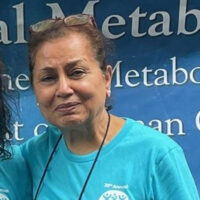History
 The inspiration for Camp came from metabolic dietitian Dr. Rani Singh, when she noticed that, especially during adolescence, patients and their families struggled with the impact of growing independence and changing lifestyle needs on patients’ ability to meet their diet prescriptions and maintain their treatment goals.
The inspiration for Camp came from metabolic dietitian Dr. Rani Singh, when she noticed that, especially during adolescence, patients and their families struggled with the impact of growing independence and changing lifestyle needs on patients’ ability to meet their diet prescriptions and maintain their treatment goals.
Dr. Singh and her team wanted to equip girls and young women to independently manage their diet and to improve their compliance. It was clear that disease and diet education programs need to be re-evaluated, improving sensitivity to the concerns of the young adult and their growing independence.
In addition, there was an urgent need for programs educating young girls with PKU about the effects of high Phe levels during pregnancy and the potential impact on a growing fetus (maternal PKU syndrome). Thus, Metabolic Camp was started in 1995 with the assistance of Nicole Guerrero, graduate student, and a generous seed donation from the Handler family.
After almost three decades, Metabolic Camp continues as a service community outreach component under the MNT4P Program.
Camp Goals
Research
A unique feature of Metabolic Camp is its research component. Because Emory University is a research institution, the Camp is in an ideal setting to conduct research studies for young women with PKU and MSUD. All clinical research done during Metabolic Camp is focused on the interventions related to the transition to adulthood, pregnancy, quality of life, and overall health outcomes.
For example, we have conducted research that supports:
- How the special diets of individuals with PKU and MSUD affect the body and brain
- Changes in bone health
- Identifying biomarkers for monitoring Phe levels in the clinic
- Optimizing test devices for monitoring Phe levels at home
Participating in research is optional for all Camp attendees. Campers may choose which research components they would like to participate in (or not) by completing the Informed Consent and HIPAA Authorization Form that is provided in the Camper Packet. All campers are expected to complete a phone consent with the Camp Research Coordinator so that the research can be explained and any questions can be answered. A phone consent must be completed by all campers, even if the camper chooses not to participate in research.
Metabolic Camp Videos
- Emory Metabolic Camp helps young women take charge of their lives
- Moms and future moms with rare inherited disorder aim for healthy babies
Faculty & Staff
 Rani H. Singh, Camp Director
Rani H. Singh, Camp Director
Pronouns: She/Her/Hers
Rani H. Singh, PhD, RDN, LD is Founder and Director of the Metabolic Camp. She establishes and leads the vision for clinical research and educational curriculum to be conducted at camp.
 Rosalynn Borlaza Blair, Assistant Camp Director
Rosalynn Borlaza Blair, Assistant Camp Director
Pronouns: She/Her/Hers
Rosalynn Blair directs camp logistics, which includes: recruitment of campers, volunteers, instructors, & exhibitors, fundraising from individuals, organizations, and educational grants, development of educational materials, and setup of lodging, facilities, & field trips.
 Serei Nath, Camp Research Coordinator
Serei Nath, Camp Research Coordinator
Pronouns: He/Him/His
Serei Nath, MPH organizes camp research activities & data collection, schedules the hospital facilities, and recruits campers to participate in available clinical research projects.
 Saran Gurung, MNT4P Senior Project Manager
Saran Gurung, MNT4P Senior Project Manager
Pronouns: He/Him/His
Saran Gurung serves as the designated contact person for the campers from Georgia participating in the MNT4P Program. As part of his role, he ensures that the standard of care protocol is followed for these campers. This includes properly taking their medical history, monitoring their medication intake, and providing other services related to medical nutrition therapy.